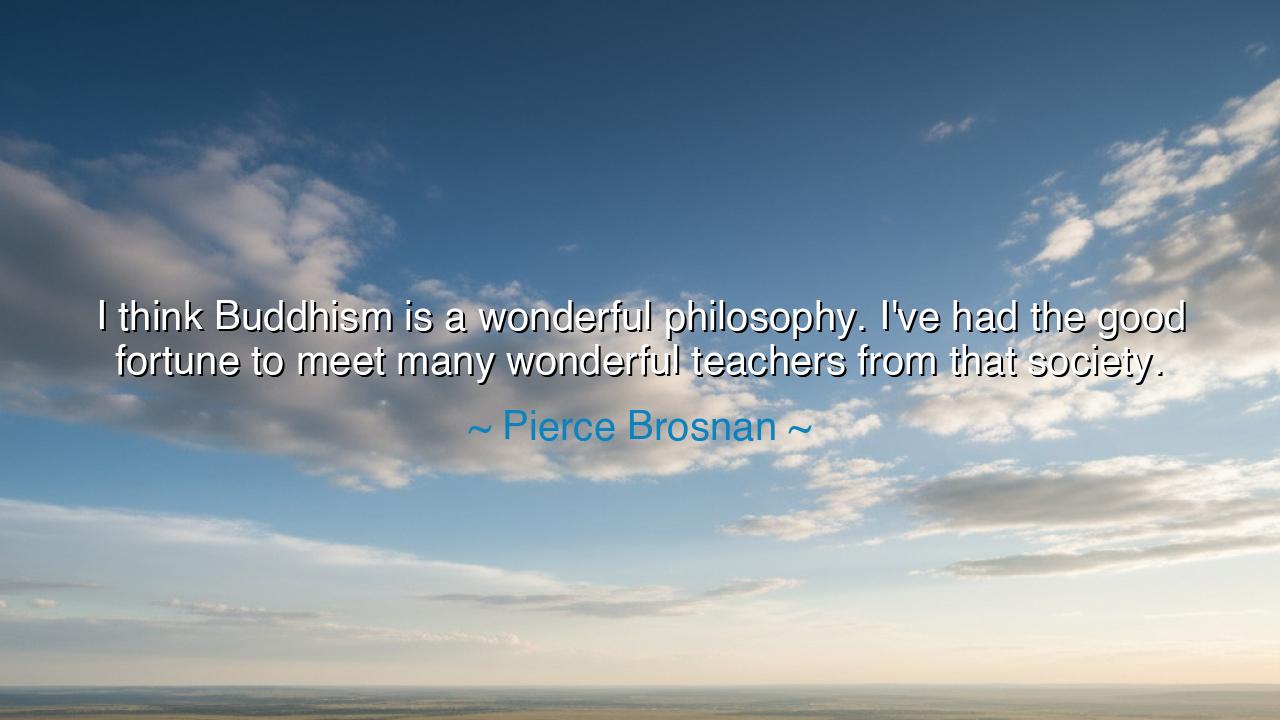
I think Buddhism is a wonderful philosophy. I've had the good
I think Buddhism is a wonderful philosophy. I've had the good fortune to meet many wonderful teachers from that society.






Hear the words of Pierce Brosnan, spoken with reverence and gratitude: “I think Buddhism is a wonderful philosophy. I’ve had the good fortune to meet many wonderful teachers from that society.” These words, though uttered by a man known to many for his craft upon the screen, reveal a truth far greater than fame. They remind us that wisdom lies not only in action or achievement, but in the company of those who guide us toward stillness, compassion, and the deeper mysteries of the soul.
For what is Buddhism, if not a river of philosophy flowing through centuries, carrying with it teachings on suffering, compassion, and liberation? Unlike systems that command allegiance through force, Buddhism invites the seeker to look inward, to observe the mind, and to walk the path of gentleness. When Brosnan honors this tradition, he honors the countless teachers who dedicate their lives to guiding others, not for wealth or conquest, but for the flourishing of the spirit. Such a society, built on reflection and compassion, becomes a lantern in a world too often darkened by greed and strife.
Consider the tale of Emperor Ashoka of India. Once a conqueror drenched in blood, his heart turned to sorrow after the carnage of the Kalinga War. In that moment of despair, he encountered the wisdom of Buddhism. Rather than expanding his empire by the sword, he spread the philosophy of compassion, building pillars inscribed with the teachings of peace and sending emissaries of kindness across the world. Ashoka’s transformation shows the living power of a teacher and the enduring strength of a philosophy rooted in empathy.
The words of Brosnan also remind us that to meet a true teacher is a blessing beyond measure. For in every age, seekers wander, but only some encounter guides who open the gates of understanding. These teachers, humble yet radiant, become bridges between confusion and clarity. They embody the spirit of their society, proving that wisdom is not bound to one man or woman, but carried forward through communities devoted to truth. Their very presence can awaken hearts and reshape lives.
The wisdom here is that true greatness is not measured by titles or crowns, but by the willingness to learn. Brosnan, though accomplished in his own craft, acknowledges himself as a student before the masters of Buddhism. In this humility lies the path to growth. For the seeker who believes he knows all will remain blind, but the one who bows before wisdom will rise with vision.
The lesson for us is plain: seek out teachers, and treasure the philosophy that nurtures compassion. Do not dismiss traditions not your own, for every society carries seeds of truth. If Buddhism teaches anything, it is that suffering is universal, and thus so too must be the cure—compassion for all beings. To ignore this is to walk in blindness; to embrace it is to begin the journey toward freedom.
Therefore, O listener, let your actions be these: when you encounter wisdom, embrace it with humility. When you meet a teacher, listen not only with your ears, but with your heart. Walk the path of compassion in your daily life, choosing kindness over cruelty, patience over anger, mindfulness over distraction. In this way, you honor not only the philosophy of Buddhism, but the deeper truth it shares with all faiths and traditions: that we are bound to one another, and that our highest calling is to bring peace into a world that hungers for it.






AAdministratorAdministrator
Welcome, honored guests. Please leave a comment, we will respond soon